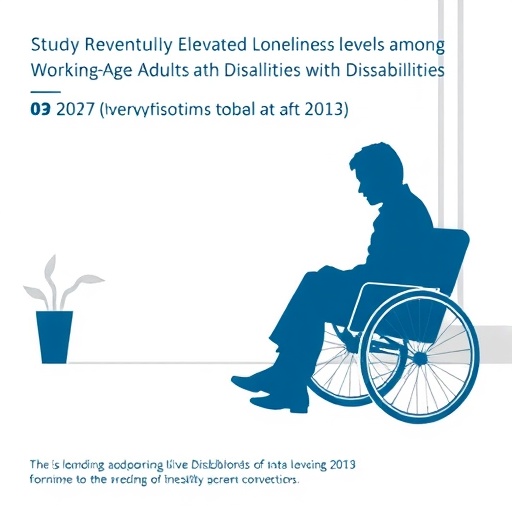A groundbreaking study from Brown University has illuminated a pervasive and underrecognized public health crisis: the disproportionately high rates of loneliness experienced by working-age adults with disabilities. Drawing on extensive data from the National Survey on Health and Disability, the research reveals an alarming preview of the social isolation burden afflicting those aged 18 to 64 living with varied disability types. This revelation not only broadens our understanding of loneliness as a critical health determinant but also exposes the entrenched structural barriers limiting societal participation among individuals with disabilities.
Loneliness—characterized by feelings of isolation, lack of companionship, and social exclusion—has long been identified as a potent risk factor for negative health outcomes, including increased morbidity and mortality. Yet, empirical research focusing specifically on the intersection between disability status and loneliness, especially within working-age populations, has remained scarce. This new analysis, published in the prestigious Annals of Internal Medicine, fills that gap by quantifying the prevalence and severity of loneliness among adults with disabilities and contrasting these findings with data from adults without disabilities.
Employing rigorous statistical methods, the researchers examined responses from over 3,800 individuals collected during two waves of the National Survey on Health and Disability conducted in late 2019 through early 2020 and then again from late 2023 through early 2024. The findings were stark: in the first wave, approximately 65% of respondents reported experiencing severe loneliness, a figure that increased to 68% in the second wave. These numbers are particularly distressing when viewed against baseline rates for adults without disabilities, where only about 8 to 10% report frequent feelings of isolation or being left out.
Delving deeper, the study parsed specific emotional dimensions of loneliness. In the initial survey wave, nearly 30% of participants frequently felt a lack of companionship, 29% often felt left out, and 34% reported frequent feelings of isolation. With the subsequent survey wave, these percentages rose markedly—to 33%, 37%, and 40%, respectively—highlighting an intensifying crisis over a relatively short period. Importantly, these experiences were reported across diverse disability types, suggesting that loneliness is a near-universal challenge for this demographic rather than confined to particular impairments.
From a sociostructural perspective, these findings underscore the complex interplay between disability and social isolation. Disabilities not only involve physical, sensory, or cognitive impairments but often reflect broader societal exclusions and inaccessibility that impede full engagement in work, community activities, and social life. Such systemic barriers exacerbate feelings of disconnection, rendering loneliness not merely a personal emotional state but a manifestation of collective societal failure.
Melissa A. Clark, a leading expert in health services and policy at Brown University, emphasized the scarcity of research on this topic and called for an urgent expansion of scientific inquiry to unravel the mechanisms underlying the loneliness epidemic among younger adults with disabilities. Her insights suggest that addressing this multidimensional public health issue requires an interdisciplinary approach integrating epidemiology, social sciences, and health policy innovation.
Complementing Clark’s perspective, co-author Maggie Salinger, an assistant professor of medicine, highlighted the concern that loneliness could compound existing health disparities known to disproportionately impact people with disabilities. This compounding effect may exacerbate chronic health conditions, mental health disorders, and reduced quality of life, thereby demanding targeted interventions uniquely tailored to this population’s needs.
The study’s publication in a high-impact medical journal signals growing recognition of loneliness as a public health priority, transcending its traditional framing as solely a psychological phenomenon. By presenting robust national data, the research challenges policymakers, healthcare providers, and community leaders to integrate loneliness mitigation services into disability support frameworks and health equity initiatives.
Key to this integration is the acknowledgment that loneliness interventions must be both accessible and customized to accommodate a spectrum of disabilities. Conventional social support programs may prove inadequate if they fail to consider mobility challenges, sensory impairments, communication barriers, or cognitive difficulties. Thus, technology-enabled solutions, inclusive social spaces, and community outreach models need to be adapted to foster meaningful inclusion.
The rising trajectory of severe loneliness—observed between the two survey waves—raises important questions about recent societal trends and environmental factors contributing to worsening social isolation. Potential drivers include economic shifts, pandemic aftereffects, reduced social services, or evolving social norms around disability. Further longitudinal research is warranted to elucidate these dynamics and develop anticipatory strategies.
Moreover, this study’s implications extend beyond health outcomes to societal well-being and economic productivity. Loneliness has been linked to diminished workplace engagement and increased healthcare utilization, suggesting that addressing isolation among working-age adults with disabilities could yield multidimensional benefits spanning individual, organizational, and societal levels.
In summary, the Brown University team’s research shifts the spotlight onto a vulnerable segment of the population whose loneliness burden has been frequently overlooked. By rigorously documenting the extent of loneliness, elucidating its systemic underpinnings, and advocating for tailored interventions, this study paves the way for enhanced public health strategies aimed at fostering inclusion and improving quality of life for people with disabilities nationwide.
Subject of Research: People
Article Title: Disproportionate Loneliness Burden Demonstrated in Two National Samples of Working-Age Adults With Varied Disability Types
News Publication Date: 5-Aug-2025
Web References: DOI 10.7326/ANNALS-25-00928
Keywords: Health and medicine




